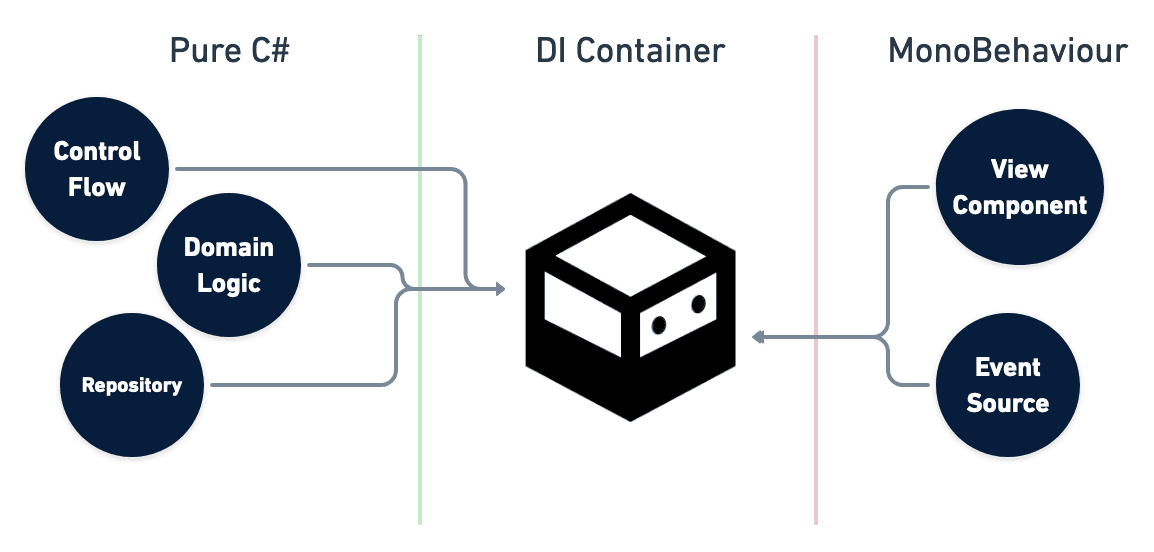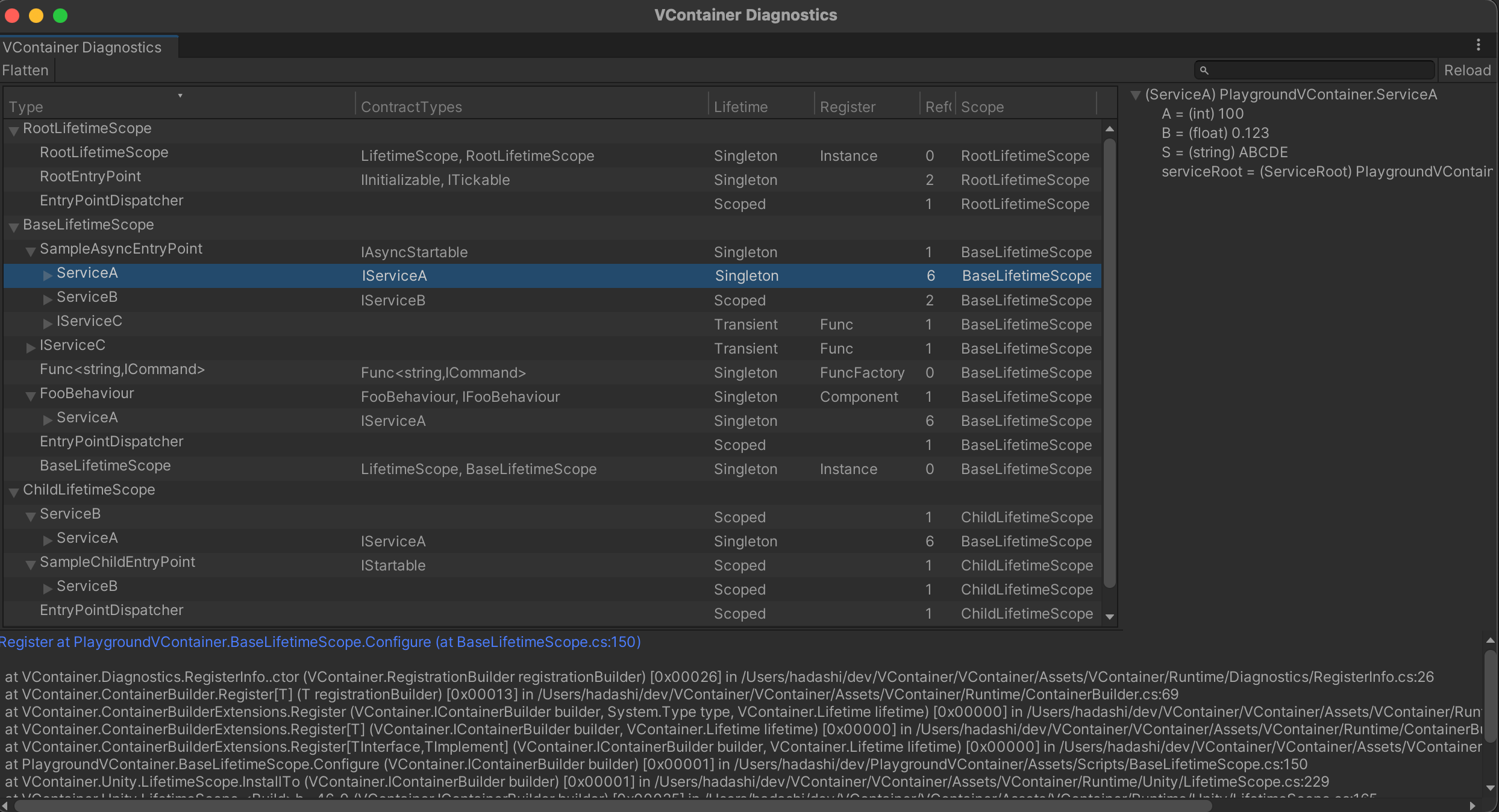VContainer
The extra fast DI (Dependency Injection) for Unity Game Engine. "V" means making Unity's initial "U" more thinner and solid..!
- Fast Resolve: Basically 5-10x faster than Zenject.
- Minimum GC Allocation: In Resolve, we have zero allocation without spawned instances.
- Small code size: Few internal types and few .callvirt.
- Assisting correct DI way: Provides simple and transparent API, and carefully select features. This prevents the DI declaration from becoming overly complex.
- Immutable Container: Thread safety and robustness.
Features
- Constructor Injection / Method Injection / Property & Field Injection
- Plain C# entry point on own PlayerLoopSystem
- Flexible scoping
- Application can freely create nested Lifetime Scope with any async way for you like.
- Accelerated mode with Roslyn Source Generator
- Diagnostics Window
- UniTask Integration
- ECS Integration beta
DI + Inversion of Control for Unity

DI containers we can make pure C # classes the entry point (not MonoBehaviour). This means that the control flow and other domain logic can be separated from the function of MonoBehaviour as a view component.
Further reading:
Performance
Benchmark result for 10,000 iterations for each test case (Unity 2019.x / IL2CPP Standalone macOS)
- By default, both VContainer and Zenject use reflection at runtime.
- "VContainer (CodeGen)" means optimization by pre-generating IL code of Inject methods by ILPostProcessor. See Optimization section for more information.
GC Alloc result in the Resolve Complex test case (Unity Editor profiled)
Basic Usage
First, create a scope. References are automatically resolved for types registered here.
public class GameLifetimeScope : LifetimeScope
{
protected override void Configure(IContainerBuilder builder)
{
builder.RegisterEntryPoint<ActorPresenter>();
builder.Register<CharacterService>(Lifetime.Scoped);
builder.Register<IRouteSearch, AStarRouteSearch>(Lifetime.Singleton);
builder.RegisterComponentInHierarchy<ActorsView>();
}
}
Where definitions of classes are
public interface IRouteSearch
{
}
public class AStarRouteSearch : IRouteSearch
{
}
public class CharacterService
{
readonly IRouteSearch routeSearch;
public CharacterService(IRouteSearch routeSearch)
{
this.routeSearch = routeSearch;
}
}
public class ActorsView : MonoBehaviour
{
}
and
public class ActorPresenter : IStartable
{
readonly CharacterService service;
readonly ActorsView actorsView;
public ActorPresenter(
CharacterService service,
ActorsView actorsView)
{
this.service = service;
this.actorsView = actorsView;
}
void IStartable.Start()
{
// Scheduled at Start () on VContainer's own PlayerLoopSystem.
}
}
- In this example, the routeSearch of CharacterService is automatically set as the instance of AStarRouteSearch when CharacterService is resolved.
- Further, VContainer can have a Pure C# class as an entry point. (Various timings such as Start, Update, etc. can be specified.) This facilitates "separation of domain logic and presentation".
Flexible Scoping with async
LifetimeScope can dynamically create children. This allows you to deal with the asynchronous resource loading that often occurs in games.
public void LoadLevel()
{
// ... Loading some assets
// Create a child scope
instantScope = currentScope.CreateChild();
// Create a child scope with LifetimeScope prefab
instantScope = currentScope.CreateChildFromPrefab(lifetimeScopePrefab);
// Create a child with additional registration
instantScope = currentScope.CreateChildFromPrefab(
lifetimeScopePrefab,
builder =>
{
// Extra Registrations ...
});
instantScope = currentScope.CreateChild(builder =>
{
// ExtraRegistrations ...
});
instantScope = currentScope.CreateChild(extraInstaller);
}
public void UnloadLevel()
{
instantScope.Dispose();
}
In addition, you can create a parent-child relationship with LifetimeScope in an Additive scene.
class SceneLoader
{
readonly LifetimeScope currentScope;
public SceneLoader(LifetimeScope currentScope)
{
currentScope = currentScope; // Inject the LifetimeScope to which this class belongs
}
IEnumerator LoadSceneAsync()
{
// LifetimeScope generated in this block will be parented by `this.lifetimeScope`
using (LifetimeScope.EnqueueParent(currentScope))
{
// If this scene has a LifetimeScope, its parent will be `parent`.
var loading = SceneManager.LoadSceneAsync("...", LoadSceneMode.Additive);
while (!loading.isDone)
{
yield return null;
}
}
}
// UniTask example
async UniTask LoadSceneAsync()
{
using (LifetimeScope.EnqueueParent(parent))
{
await SceneManager.LoadSceneAsync("...", LoadSceneMode.Additive);
}
}
}
// LifetimeScopes generated during this block will be additionally Registered.
using (LifetimeScope.Enqueue(builder =>
{
// Register for the next scene not yet loaded
builder.RegisterInstance(extraInstance);
}))
{
// Loading the scene..
}
See scoping for more information.
UniTask
public class FooController : IAsyncStartable
{
public async UniTask StartAsync(CancellationToken cancellation)
{
await LoadSomethingAsync(cancellation);
await ...
...
}
}
builder.RegisterEntryPoint<FooController>();
See integration for more information.
Diagnostics Window

See diagnostics for more information.